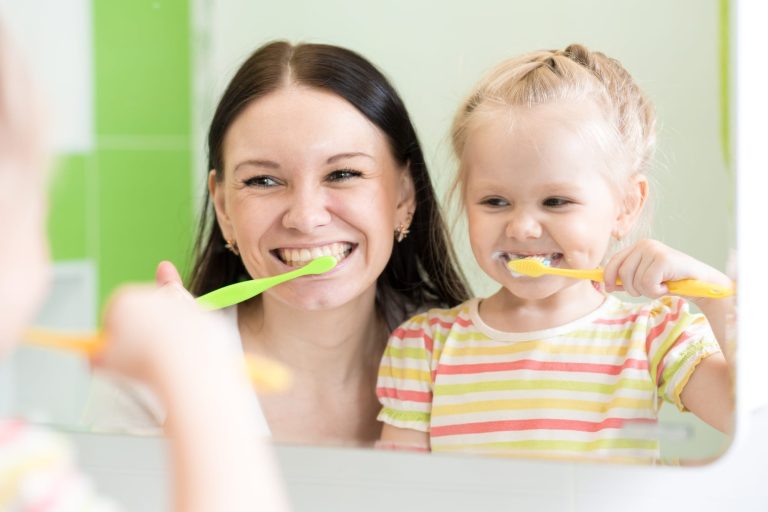Baby Toothbrushing Strategies for Mastering Oral Care!

Discover expert tips to make baby toothbrushing easy! From teething challenges to playful techniques, learn how to create a positive oral care routine for your little one.
Why is My New Baby Resisting Toothbrushing? Understanding Teething and Sensory Factors

Introduction:
Babies might not like brushing because it feels weird or hurts when their teeth come in. They might need to learn what the toothbrush is and that they don’t like the taste of toothpaste. Babies also want to do things independently and might prefer someone else to brush for them. We can help by choosing the right time to brush, making it fun, and being patient. Showing how to brush, using gentle moves, and giving mild praise can make brushing better for babies.
Reasons why a new baby might refuse toothbrushing:
- Teething Discomfort:
Teething is a common cause of resistance to toothbrushing. Babies experience discomfort and pain as their teeth emerge through the gums. The pressure of a toothbrush against sensitive gums can exacerbate this discomfort, leading to resistance.
- Sensory Sensitivity:
Babies have sensitive mouths, and the sensation of a toothbrush bristle against their gums might be overwhelming or uncomfortable for them. Babies may be more sensitive to touch during teething periods.
- Unfamiliarity:
Babies are naturally cautious about new experiences. A toothbrush is a foreign object they are not used to having in their mouth. This unfamiliarity can lead to resistance.
- Taste and Texture:
The taste and texture of toothpaste might be unfamiliar or unappealing to a baby. Babies have taste preferences, and the taste of toothpaste can be a factor in their resistance.
- Gag Reflex:
Babies can feel uncomfortable when we brush their teeth because they have a reflex that makes them feel like they need to gag. We should use a soft toothbrush and be gentle to make it easier for them. It’s also good to start brushing their teeth when they are young and distract them with toys or singing. With practice, brushing teeth can become a pleasant experience for the baby and the person caring for them.
- Control and Autonomy:
Babies develop a sense of control and autonomy even at a young age. Having someone else insert a toothbrush into their mouth and manipulate it might make them resist out of a desire for independence.
- Negative Associations:
If a baby has experienced discomfort, pain, or gagging during previous toothbrushing attempts, they might develop negative associations with the activity and resist further attempts.
- Timing and Mood:
Babies have their rhythms and moods. Brushing their teeth when tired, hungry, or otherwise irritable makes them more likely to resist.
Dealing with a Reluctant Baby: Expert Strategies for Overcoming Toothbrushing Struggles
Strategically Time Your Brushing Sessions:
Timing is paramount when it comes to toothbrushing success. Choose a moment when your baby is most content and relaxed. Post-meal or after naptime could be ideal times, as your baby is more likely to cooperate. Avoid brushing when your baby is tired or cranky, which may increase resistance.
Infuse Playfulness into Toothbrushing:
Infusing an element of play can make toothbrushing enjoyable for your baby. Opt for toothbrushes with vibrant colors and captivating designs. Additionally, create a catchy toothbrushing song or make up a fun story about “brushing away sugar bugs.” This interactive approach captures your baby’s attention and transforms brushing into an engaging activity.
Set an Example to Encourage Imitation:
Babies are natural mimics. Use this to your advantage by demonstrating toothbrushing with exaggerated motions and animated facial expressions. Your actions intrigue your baby, and they may want to imitate you. This imitation can create a sense of camaraderie and encourage cooperation.
Gradual Introduction of the Toothbrush:
To ease your baby into the toothbrushing routine, gradually introduce the toothbrush. Allow your baby to hold and explore the toothbrush on their terms. This tactile familiarity can help reduce any anxiety associated with the toothbrush and make your baby more receptive to the process.
Choose a Mild, Appealing Toothpaste:
Choosing the appropriate toothpaste can significantly impact your baby’s willingness to participate. Opt for a toothpaste specifically designed for babies, featuring a mild flavor. The toothpaste’s taste should appeal to your baby’s sensitive palate, making the experience more agreeable.
Employ a Gentle Touch:
Gentleness is critical during toothbrushing. Utilize soft, circular motions to brush your baby’s teeth and gums. If too much pressure is applied, it can lead to discomfort and resistance. A gentle touch ensures your baby’s comfort and minimizes any potential aversion.
Distraction Techniques:
Introduce a distraction to keep your baby engaged during toothbrushing. Offer a safe, baby-friendly toy, a captivating picture, or even a mirror for your baby to explore. This diversionary tactic shifts your baby’s focus away from the toothbrushing process, making it less overwhelming.
Involvement and Autonomy:
Empower your baby by involving them in the toothbrushing routine. Allow them to hold their toothbrush, encouraging a sense of autonomy. You can also give them a damp cloth to wipe their gums and teeth, fostering a feeling of participation and control.
Positive Reinforcement and Celebration:
Celebrate small victories! Praise your baby for their cooperation with enthusiastic words and applause. Encouraging and rewarding good toothbrushing habits can significantly impact the development of a positive attitude toward oral hygiene. Consider introducing a reward system, like a chart with stickers, to encourage your little one and recognize their hard work.
Maintain a Calm and Patient Demeanor:
Your baby is sensitive to your emotions. If you display frustration or impatience, your baby might become apprehensive. Maintain a calm and patient demeanor throughout the toothbrushing process. Approach each session with understanding and a soothing tone, creating a tranquil atmosphere for you and your baby.
Conclusion:
Overcoming toothbrushing resistance with your baby demands creativity, patience, and persistence. By implementing these comprehensive strategies, you can transform toothbrushing into a positive routine that nurtures your baby’s oral health. Remember, the aim is to establish healthy oral hygiene habits from the start, setting the stage for a lifetime of radiant smiles and optimal well-being.






